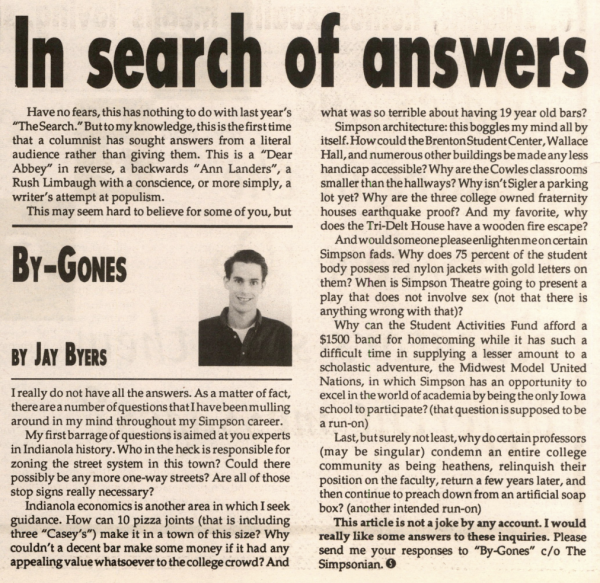Our View: Let’s open the discussion about mental health
More than half of college students experience some sort of mental health concerns
February 16, 2017
We talk about sex. We talk about racial injustice. We talk about politics. And we talk about controversies brewing on Simpson College’s campus.
But what’s sorely missing from the discussion is an issue that affects more than half the college population, according to the American College Health Association: mental health concerns. Thirty-two percent of undergraduate students reported that stress had a continuous negative impact on their academic performance.
Even more alarming, a recent study found while mental health needs on college campuses across the United States rise, funding given to counseling centers remain unchanged.
The Center for Collegiate Mental Health released its 2016 report of data from more than 400 university and college counseling centers, and found that anxiety and depression continue to be the greatest mental concern among college students. Meanwhile, academic distress, eating concerns and familial problems are decreasing.
The Simpsonian reported on the epidemic last year, in which Don Evans, chair of the psychology department at Simpson, explained: “Our biology doesn’t change fast enough to account for the rate of increase that we’re seeing. Whatever is going on, we’re pretty sure it’s social, not biological.”
We cannot continue to stand on the sidelines and report on these heartbreaking cases that could end in tragedy.
Taking Evans’ research into account, the change begins with you. Not a pharmaceutical company in Silicon Valley. Not a well-respected celebrity who’s donated millions of dollars to philanthropic causes. Not political figures who, even without the corruption and agenda, have the power to effect change, at least from a legislative standpoint.
Said one foreign exchange student from Norway: “Americans don’t really talk about mental health issues, which is really surprising to me.”
She has a point.
We indulge in sex, drugs and rock ‘n’ roll. Messages from two major events broadcast on U.S. airwaves, the Super Bowl and the Grammy awards, strayed very little from taking a swipe at President Donald Trump and his recent controversial executive orders.
That’s not to say you shouldn’t fight for what you believe is right.
But it nonetheless reaffirms the reason for which mental health concerns are rising: Nobody is talking about it, which can have detrimental effects on one’s overall well-being.
“I think, in general, people wait until things are too painful before they seek help,” Evans said. “I don’t think college students are any different. I think that often we have services available that people don’t access or seek out.”
The Anxiety and Depression Association of America estimates only one-third of the population that suffers from mental health issues seeks treatment.
The stigma — that signs of depression or anxiety equate to weakness — is exacerbated in the media. Boys don’t cry. Girls who do are emotionally unstable.
It’s an elephant in the room that weighs on one’s shoulders. It’s OK to admit you’re human.
If Meryl Streep’s jab at the current administration can spark nationwide debate (for better or for worse) about human rights and acceptance, then why can’t we open up a discussion about mental health in the hopes we would see a similar desire to effect change?
In an age where millennials are perceived as “snowflakes,” or those who need coddling, the call for help is quite the opposite.
Show resilience. Show you’re worth the time to get the help you need.
“We never turn anyone away here,” Ellie Olson, director of Counseling Services, told The Simpsonian last year. “It’s normal to struggle, but if it’s getting in the way of having the type of college experience that you want, whether that’s academically or socially, that’s a time to come in and seek help.”
Accessibility remains the No. 1 reason why people who struggle with mental health issues don’t seek help. But it isn’t the only issue.
“Prevention is a much better plan than therapy,” Evans said. “If you can do an intervention that prevents a whole lot of unhappiness from ever occurring to begin with, then you’re way ahead of trying to help people after they’ve already experienced some kind of disaster.”
Here are five tips from health experts to cope with depression or anxiety:
1. Exercise. Activity releases endorphins, which are neurotransmitters that produce positive feelings, an effective way to combat moderate depression.
2. Don’t be a hermit. College and career experts say a work overload takes away from the social experience of college. In addition to studying, a healthy balance of networking and extracurricular activities is needed to boost your mood.
3. Use counseling services. First, you’re already paying for it. Second, they’re here to support you. Office hours are 8 a.m. to 4:30 p.m. Monday through Friday, or schedule an appointment by calling 515-961-1332 or emailing [email protected].
4. Use technology to your advantage. But don’t be consumed by it. Mental health experts say making new friends in college is crucial, but don’t allow bonds from before college to dissolve, such as family members and childhood friends.
5. Sleep. A no-brainer, but late-night studying and partying not only leads to tiredness, but also depression. Sleep is key to learning and memory formation, which helps with studying. That’s why you’re in school anyway, right?
If you or someone you know struggles with depression or anxiety, call the National Suicide Hotline at 1-800-273-TALK (8255).













